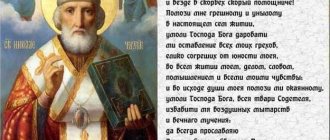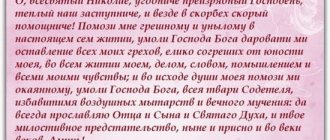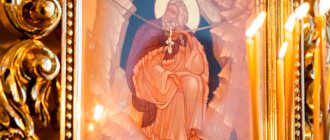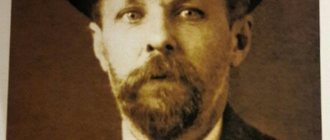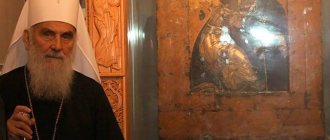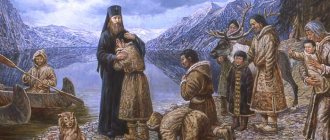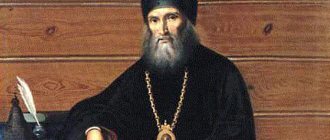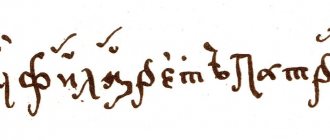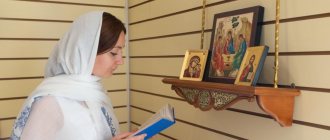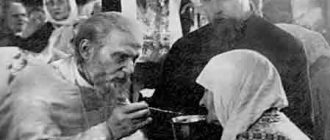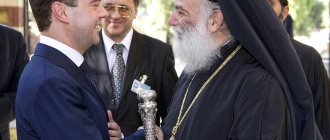| St. Ermogen of Moscow. Miniature of the Tsar's title book, 1672 |
Hermogenes
[1] (c. 1530 - 1612), Patriarch of Moscow and All Russia (1606 - 1612), martyr Commemorated on February 17, May 12 on the day of glorification, in the Cathedrals of Moscow Saints and Saints
In the world, Ermolai was born around 1530 into a family of Don Cossacks. According to the testimony of the Patriarch himself, he was a priest in the city of Kazan at the Gostinodvorsky Church in the name of St. Nicholas. According to contemporaries, the priest Ermolai even then was “a man highly adorned with wisdom, elegant in book teaching and renowned for the purity of his life.”
In 1579, already being a presbyter, he witnessed the miraculous appearance of the Kazan Icon of the Mother of God. God destined him to be the first to “take up from the earth” the priceless image, show it to the assembled people and then solemnly, with a procession of the cross, transfer it to the neighboring St. Nicholas Church.
He became a monk with the name Ermogen and from 1582 [2] was the archimandrite of the Transfiguration Monastery in Kazan.
The beginning of the way
Precise data on the biography of Hermogenes has not survived, and evidence of his activities is immortalized through records made by contemporaries and descendants. Presumably, he was born in 1530 and was the same age as Ivan the Terrible. There is an assumption among historians that the child named Ermolai was by origin related to the Don Cossacks or to the Shuisky and Golitsyn dynasties.
As a young man, he moved to Kazan, where the Spaso-Preobrazhensky Monastery became his refuge. Here the young man became firmly established in his faith and decided to devote himself to serving the Lord. In the 1570s, Ermolai lived in the parish of the Gostinodvor Church of St. Nicholas and served as a priest.
Published by Elizaveta Semennikova Wednesday, November 27, 2019
Icon of Patriarch Hermogenes
Historical sources describing the life of the patriarch mention an incident that is called a miracle. In 1579, during a severe drought, a terrible fire occurred in Kazan. The flames spread from St. Nicholas Church to the Kremlin, and then spread across the roofs of houses.
While the fire was burning, the archer's daughter had a vision three times about the hidden icon of the Mother of God. The shrine was found where the girl predicted. Church ministers and townspeople organized a religious procession. They moved the icon to the Annunciation Cathedral. During the service, two blind people were healed. Hermogenes was a participant in the event and a witness to what was happening.
Kazan Metropolitan
On May 13, 1589, he was consecrated bishop and became the first Metropolitan of Kazan.
Possessing an extraordinary literary talent, the saint himself composed in 1594 a legend about the appearance of the miraculous icon and the miracles performed by it.
In 1591, the saint gathered newly baptized Tatars to the cathedral and for several days instructed them in the faith. In 1592, the relics of St. Herman, the second Kazan Archbishop (+ 1567), were transferred. With the blessing of Patriarch Job (1589-1605), Saint Hermogen performed their burial in the Sviyazhsk Dormition Monastery.
On January 9, 1592, Saint Hermogen sent a letter to Patriarch Job, in which he reported that in Kazan there was no special commemoration of the Orthodox soldiers who laid down their lives for the faith and Fatherland near Kazan, and asked to establish a specific day of remembrance. At the same time, he reported on three martyrs who suffered in Kazan for the faith of Christ, one of whom was Russian, named John, and the other two, Stephen and Peter, were Tatar converts. The saint expressed regret that these martyrs were not included in the synodikon read on the Sunday of Orthodoxy, and that eternal memory was not sung to them.
In response to Saint Hermogenes, the Patriarch sent a decree dated February 25, which ordered “for all Orthodox soldiers killed near Kazan and within Kazan, to perform a memorial service in Kazan and throughout the Kazan Metropolis on the Saturday after the Intercession of the Most Holy Theotokos and to include them in the great synodik, read on the Sunday of Orthodoxy,”
It was ordered that the three Kazan martyrs be included in the same synodik, and the day of their memory was entrusted to determine Saint Hermogenes. The saint announced a patriarchal decree for his diocese, adding that all churches and monasteries should serve liturgies and memorial services for the three Kazan martyrs and commemorate them at litias and liturgies on January 24. Saint Hermogen showed zeal for the faith and firmness in observing church traditions, and cared about enlightening the Kazan Tatars with the faith of Christ.
In 1595, with the active participation of the saint, the discovery and discovery of the relics of Kazan miracle workers took place: Saints Guria, the first Archbishop of Kazan, and Barsanuphius, Bishop of Tver. Tsar Theodore Ioannovich (1584-1598) ordered the construction of a new stone church in the Kazan Spaso-Preobrazhensky Monastery on the site of the previous one, where the saints were buried. When the coffins of the saints were found, Saint Hermogenes came with a council of clergy, ordered the coffins to be opened and, seeing the incorrupt relics and clothes of the saints, informed the Patriarch and the Tsar. With the blessing of Patriarch Job and by order of the king, the relics of the newly-minted miracle workers were placed in the new temple. Saint Hermogen himself compiled the lives of Saints Gurias and Barsanuphius.
Upon the accession of False Demetrius I to the Moscow throne, Ermogen was summoned to Moscow to participate in the Senate established by the new tsar, but could not get along for long in the capital next to the tsar, who was alien to religious intolerance and prone to rapprochement with foreigners. When, before the marriage of False Demetrius to Marina, Mniszech the question arose whether Marina should not first be baptized into Orthodoxy, Ermogen was among those clergy who most insisted on this, and for such opposition to the tsar’s intentions he was removed from Moscow to his diocese.
The new Tsar Vasily Shuisky decided to elevate Hermogenes, as an enemy of the previous government, to the place of the deposed Patriarch Ignatius.
Life and feat
In 1587, the clergyman took monastic vows and became a monk at the Moscow Chudov Monastery. Two years later, he was ordained and subsequently, thanks to the patronage of Patriarch Job, became a metropolitan. On the initiative of Hermogenes, in 1591, Kazan introduced the Day of Remembrance of Orthodox soldiers who died during the capture of the city. With Job's blessing, this innovation was approved.
Hermogenes spread Orthodoxy among other nationalities. He shared his knowledge with the Tatars and representatives of Turkic peoples.
In 1598, Tsar Fyodor Ivanovich died, and Boris Godunov came to power. Hermogenes was present at the election of the new monarch. After the occupation of the throne by False Dmitry I, the Metropolitan worked in the Boyar Duma, but acted as an opponent of the impostor. He demanded the baptism of Marina Mnishek and opposed the election of Patriarch Ignatius.
Patriarch Hermogenes in the dungeon of the Chudov Monastery.
Published by AQVA REGIA Saturday, May 12, 2022
Patriarch Hermogenes in the dungeon of the Chudov Monastery
When Grigory Otrepiev was overthrown in 1606, power was concentrated in the hands of Vasily Shuisky, and Hermogenes replaced the hated Ignatius. Shuisky was afraid that Filaret might take his place, but in 1606 the patriarch was confirmed in the rank. Despite the disagreement and obvious confrontation with the king, Hermogenes always defended him.
Trust in Shuisky was undermined by peasant uprisings and the appearance of False Dmitry II. A conspiracy arose, as a result of which it was planned to overthrow the king. Hermogenes was brought to Lobnoe Mesto and demanded support in the issue of a government coup. The patriarch accomplished a feat, putting his own life at risk. He acted as a patriot and refused to condone the rebels. The rebels went over to the side of False Dmitry II. Hermogenes sent them two letters, instructing them to return to the true path and repent.
Hermogenes, Patriarch of Moscow and All Rus'.
Published by First Monastic Health Center Wednesday, September 18, 2013
Patriarch Hermogenes and the Kazan Icon of the Mother of God
At first, the instigators failed to call the people to an uprising, but the deposition of the tsar still took place in 1610. Until the last moment, Hermogenes sided with the monarch. Even after being imprisoned in the Chudov Monastery, the patriarch demanded that the king be returned to the throne. Power passed into the hands of the seven-boyars. The clergyman condemned these changes and tried to organize elections to place the Russian Tsar on the throne. But Vladislav Sigismundovich was elected ruler. Hermogenes had to recognize his status on condition of baptism and the removal of the Polish-Lithuanian Commonwealth soldiers from Russian soil.
During the Polish invasions, the patriarch turned to his fellow countrymen for help, and his call was supported by the defenders of his homeland. A copy of the Kazan Icon of the Mother of God was brought to Kazan, which became the main shrine of the people's militia.
During the attack on Moscow, Hermogenes was captured. He was deposed and sent to the dungeon of the Chudov Monastery. The Poles repeatedly demanded an end to resistance, but the church minister ignored the messages and called on the patriots not to give up. Having refused the Poles, the monk doomed himself to death, the cause of which was hunger and thirst.
The king is not real again
The fact is that Shuisky as a tsar was perceived by the people to an even lesser extent than even Boris Godunov. They were “unnatural” kings. Whereas the False Dmitrys claimed that they were the descendants of Ivan the Terrible, that is, the “natural” monarch of all Rus'.
At the same time, Ivan Vasilyevich, and even the most critical historians admit this, as the years passed, he enjoyed increasing popular popularity. The oprichnina began to be perceived by the people as an ideal tsarist order, in which the autocrat “crushed the boyars” and allowed the common people to live. And not only to live, but also to rise from the bottom along the social and political ladder. That’s why the people wanted Ivan the Terrible’s heir to the throne, seeing in him the continuer of their father’s work.
As for Godunov, Shuisky, and even more so, the Seven Boyars, in the popular consciousness they were representatives of that same hated aristocratic class. Moreover, their rule was associated with the troubles of the troubled times.
Both Patriarch Job and, at first, Patriarch Hermogenes failed to convince the masses that the real Tsarevich Dmitry was dead, and the succession of False Dmitrievs were nothing more than impostors.
Death
Hermogenes was starved to death in captivity, but his work was completed. In October 1612, Kuzma Minin and Dmitry Pozharsky expelled the occupiers from Moscow. Six months later, Mikhail Romanov, who was favored by the patriarch, became king.
In 1652, the remains of a church minister were transferred from the Chudov Monastery to the Great Assumption Cathedral and placed in a wooden tomb. The reliquary for the relics was commissioned by Nicholas II. Hermogenes was canonized and recognized as a martyr in 1913. Every year on March 2, the day of remembrance of the Patriarch is celebrated.
Martyrdom
The Patriarch prayed until his last breath. It so happened that he spent the last days of his life away from loved ones or associates. There was no one to come to Hermogenes and give him a glass of water or a piece of bread.
Prayer helped the saint to accept death with dignity. In the winter of 1612, Hermogenes died in captivity from hunger, without waiting for the liberation of Moscow. His death was recognized as martyrdom, and the personality of the saint was canonized by the Russian Orthodox Church.
Reverence
In 1913, the first temple in honor of Hermogenes was consecrated. It was organized by the Russian Monarchical Assembly. Three years later, an akathist to St. Hermogenes was published in the Theological Bulletin.
On May 25, 2013, in the Alexander Garden of Moscow, a monument to Hermogenes was erected and unveiled as a holy martyr and guardian of the faith in Rus'.
Published International Thursday, February 28, 2022
Monument to Patriarch Hermogenes
100 years later, in 2013, a monument in honor of the saint was opened in Moscow. The monument is located near the Kremlin walls, in the Alexander Garden. The authors of the sculpture are Salavat Shcherbakov and Igor Voskresensky. A year later, the Armenian community of Almetyevsk sponsored the opening of a monument at the Kazan Cathedral of the city. Believers still turn their prayers to Saint Hermogenes today.
Good Shepherds
At one point, Hermogenes blessed the Kazan Metropolitan Ephraim, who generally imposed an interdict on the entire city of Sviyazhsk. In fact, for loyalty to traitors and rebels, Ephraim deprived the city of the opportunity to conduct Orthodox services, take part in the Sacraments, and, in general, to be Orthodox.
Hermogenes approved this step and called Ephraim “the good shepherd.” By the way, the interdict had the most favorable effect on Sviyazhsk; the townspeople completely took the side of both the Church and the state authorities, categorically dissociating themselves from the rebels. And these were the rebels of Ivan Bolotnikov.
Patriarch Hermogenes in culture
Like the feat of Ivan Susanin, the deeds of Patriarch Hermogenes left a mark on history, immortalizing his name as a hero of the era.
The fate of the clergyman, whose role in the history of the state is difficult to overestimate, has repeatedly inspired his descendants. His name is mentioned in the “New Tale of the Orthodox Russian State,” created in 1611. The opera “Saint Hermogenes” is dedicated to the Patriarch. The image of the hero was embodied in the production of “The Tsar’s Path,” which was staged at the Moscow Russian Drama Theater. In 1860, Pavel Chistyakov painted a painting dedicated to Hermogenes’ refusal to the Poles.
Epistles of Hermogenes
Hermogenes, by the way, entered into active confrontation with False Dmitry I, who was introduced by him to the Duma. He demanded the adoption of Orthodoxy by Marina Mniszech and, moreover, insisted on strengthening the role of the Orthodox Church. The Poles' protégé, False Dmitry, naturally could not allow this. And Hermogenes was saved from exile that time only by the death of the impostor.
Although False Dmitry died, the turmoil continued. And Hermogenes, elected head of the Russian Church, continued the fight against it. He sent messages to cities and villages, in which he said that the relics of the real Tsarevich Dmitry were in Moscow, and excommunicated traitors from the Church, both individually and collectively.
The style of these messages is characteristic: “I am addressing you, former Orthodox Christians, of every rank and age. You have fallen away from God, from truth and the Apostolic Church. I cry, have mercy on your souls. You have forgotten the vows of your Orthodox faith, in which you were born, baptized, raised, and grew up. Look how the Fatherland is plundered and ruined by strangers, how holy icons and churches are desecrated, how the blood of innocents is shed and cries out to God. Who are you taking up arms against? Isn’t it against God who created you, isn’t it against your brothers, isn’t it against your own Fatherland? I conjure you in the name of the Lord God, leave your undertaking while there is time so as not to perish. And we welcome you who repent.”
That is, betrayal of the state in the minds of the patriarch was quite identical to betrayal of God himself, but he still left the way for the rebels to return and repent. And, I must say, it worked.
Interesting Facts
- Hermogenes was married before being ordained. There is no mention of the cause of his wife’s death, but after her death he finally connected his life with serving God.
- The Patriarch was incredibly wise, erudite and educated. The lives of saints and other church works belong to his pen.
- The church leader personally monitored the correctness of materials published during the reign of the Russian Orthodox Church. Under his supervision, printing presses were replaced and a printing house was rebuilt.
- Under Hermogenes, the resettlement of newly baptized peoples to Russian lands was carried out so that the Orthodox would not communicate with representatives of other religions and beliefs.
- In 2012, the premiere of a documentary film dedicated to the life of the Patriarch of Moscow and All Rus' took place. It is called “Patriarch Hermogenes - a great mourner for the Motherland.”
The Russian Orthodox Church in troubled times
At the beginning of the 17th century. The spiritual expansion of the Catholic world unfolded against Orthodox Rus', which took the form of Polish intervention under the leadership of self-proclaimed pretenders to the Russian throne. They sought to impose on the Russian people not only foreign political domination, but also a religious yoke, which even the Mongol conquerors did not dare to do at one time.
The boyar aristocracy, which repeatedly violated the duty of public service for the sake of the triumph of its oligarchic interests, was ready to come to terms with the Polish prince Vladislav becoming the Russian throne, without even demanding from him firm guarantees of preserving the Orthodox foundations of the spiritual and social life of Rus'.
Finally, the Russian people, who had so often been deceived by their secular rulers, were increasingly drawn into a bloody civil strife that threatened to burden the conscience of millions of Russian people with the terrible sin of fratricidal war and open up the dangerous prospect of complete ethnic extinction.
It was at this tragic moment in Russian history, when the country began to lose the concept of national statehood and found itself on the verge of a historical catastrophe, that the Lord placed a holy man, His Holiness Patriarch Hermogenes, at the head of the Russian Orthodox Church.
early years
To date, no reliable sources have been found telling about the childhood of the future Orthodox saint, Patriarch Hermogenes. Researchers determine the date of his birth as 1530 . This statement is based on the memories of the Poles who seized power in Moscow in 1610. They speak of Hermogenes as if he were an 80-year-old man.
It is known about the early years of his life that at birth the future patriarch received the name Ermolai and in adolescence decided to devote himself to the church, entering the service at the Spaso-Preobrazhensky Monastery in Kazan. Later he became a priest in the Church of St. Nicholas the Wonderworker.
Patriarch Hermogenes in a miniature from the Royal Titular Book
Prayers
All prayers to the Hieromartyr Hermogenes, Patriarch of Moscow.
Troparion, tone 4
The Russian land is the first altar / and vigilant prayer to God for it! / For the faith of Christ and your flock you laid down your soul, / You delivered our country from wickedness. / Still crying out You:/ save us with your prayers,// Hieromartyr Ermogen, our father.
Translation: High Hierarch of the Russian land and a tireless prayer book to God about it! Having laid down your soul for the faith of Christ and your flock, you delivered our country from lawlessness. Therefore we appeal to you: “Save us with your prayers, Hieromartyr Hermogenes, our father.”
Kontakion, tone 6
We are exhausted by prison and hunger, / you remained faithful even to death, blessed Hermogene, / driving away cowardice from the hearts of your people / and calling everyone to a common feat. / Likewise, the wicked are minted You have overthrown and you have established our country, / let us all call to you: // Rejoice, protector of the Russian land.
Translation: We exhaust you with prison and hunger, until your death you remained faithful, blessed Hermogenes, driving away cowardice from the hearts of your people and calling everyone to a common feat. With this you pacified the rebellion of the wicked and strengthened our country, and we all cry to you: “Rejoice, protector of the Russian land.”
Prayer
Oh, great saint of Christ, our holy father Hermogenes! To you, a warm man of prayer and a shameless representative before God, we diligently flock to you, asking for consolation and help in our needs and sorrows. In the ancient time of temptation, our country was suddenly attacked by wickedness. The Lord has revealed His unshakable pillar to the Church and the shepherd of goodness to the Russian people, who laid down his soul for the sheep and drove away the fierce wolves. Now look down on us too, your unworthy child, who calls you with a tender soul and a contrite heart. For our strength within us has become impoverished, and the enemy’s trappings and nets have devastated us. Help us, our intercessor! Confirm us in the holy faith: teach us to always keep the commandments of God and all the traditions of the church, commanded to us from our father. Be our shepherd, the archpastor, the spiritual leader of the warrior, the sick doctor, the comforter of the sad, the persecuted intercessor, the youth's mentor, a gracious father to all and a warm prayer book for everyone; Let us protect you with your prayers and unceasingly sing and glorify the all-holy name of the Life-Giving Trinity, the Father and the Son and the Holy Spirit, forever and ever. Amen.
Akathist to the Hieromartyr Hermogenes, Patriarch of Moscow and All Russia, Wonderworker
Kontakion 1
A great leader of warriors for the faith of Christ, a warm comforter to all those who are attacked and burdened with many sorrows, an unshakable pillar of the Orthodox faith, for whose sake you laid down your soul for your friends, and you freed us from the snares and snares of the enemy. And now you are glorified by the Lord by the manifestation of your miracles, in whose image you have gathered us with a tender soul to sing to you:
Rejoice, Saint Hermogenes, good shepherd and great intercessor of the Russian land
Ikos 1
The merciful Christ, the guardian angel of the Russian land, appeared to you in the ancient days of rebellion and disorder, and saved you from sinful wandering. And now show you as a prayer book of warmth and a miracle worker, as a sign of our life; and even now all who wander after you, like sheep without a shepherd, and having found salvation through you, let them sing to you:
Rejoice, our Church has a wise leadership;
Rejoice, warm provision for the children of the Church.
Rejoice, church affirmation of our country;
Rejoice, Orthodox illumination for the sons of the kingdom.
Rejoice, good teaching to the shepherd and the flock;
Rejoice, thou king of our advice and consolation.
Rejoice, Saint Hermogenes, good shepherd and great intercessor of the Russian land.
Kontakion 2
Seeing Rus', like a widow, weeping wildly for the destruction of her house, having mercy, you carried her sorrows on your shoulders and even bore her to the point of death. For this reason, you rejoice forever in heaven, singing to God: Alleluia.
Ikos 2
With the mind of love, punishing and merciful, you ruled, O saint, your Kazan flock, like a ship sunk in the abyss of evil, and you brought it to the quiet haven of the holy Orthodox Church, and we sing to you in gratitude:
Rejoice, receptacle of the mind of Christ;
Rejoice, repository of the Church's wisdom.
Rejoice, O Lord, who illuminates everyone with the light of truth;
Rejoice, wisdom, enlightener of the unwise.
Rejoice, evangelist of Orthodox truth;
Rejoice, exposer of human superstition and untruth.
Rejoice, Saint Hermogenes, good shepherd and great intercessor of the Russian land.
Kontakion 3
By the power of faith and spiritual reason, strengthening your newly baptized flock in the city of Kazan, with the full armor of God's grace you defeated the machinations of the enemies of the Orthodox faith of Christ and taught your children to continually cry out to God: Alleluia.
Ikos 3
Having the grace of the priesthood, well carried in the fragrant vessel of your soul, you were vouchsafed, Father Hermogenes, to take from the earth the holy icon of the Most Pure Mother of God, miraculously revealed in the city of Kazan, and glorify it according to its heritage. In the same way, you strive for us to cry out to you:
Rejoice, first glorification of the miraculous icons of Kazan;
Rejoice, miracles from sowing the icon are not a false message.
Rejoice, glory to the Mother of God, touched by the song-maker;
Rejoice, warm prayer book before Her for your flock.
Rejoice, Mother of God, as the Intercessor of the Orthodox Kingdom of Russia, honor;
Rejoice, shed tears for the establishment of this kingdom before the Most Pure One.
Rejoice, Saint Hermogenes, good shepherd and great intercessor of the Russian land.
Kontakion 4
We are agitated by a storm of doubtful thoughts and rebellious aspirations and plunged into the abyss of heterodox superstition, Rus' is drowning. Having seen you, the saint of God, as “an unshakable pillar and adamantine steadfast,” rejoicing in hope and strengthened by you, he sings to God: Alleluia.
Ikos 4
Hearing the lawless intention of the self-proclaimed tsar to mock the Orthodox faith, you boldly told him that it was not proper for an Orthodox tsar to marry a heretic, and thus you exposed his unbelief and wickedness. For this reason, I raised up persecution and from the throne city of you, the saint, the monster. We, honoring this love of truth of yours, sing to you who are mighty in the Lord:
Rejoice, strong champion against the self-proclaimed ruler;
Rejoice, bold intercessor for the Orthodox faith.
Rejoice, righteous reproof of the foolishness of heterodoxy;
Rejoice, unceasing edification of saving Orthodoxy.
Rejoice, you who were exiled for the sake of truth;
Rejoice, thou crowned with eternal glory in heaven from the Lord.
Rejoice, Saint Hermogenes, good shepherd and great intercessor of the Russian land.
Kontakion 5
I will show you in the heavens in the host of the holy martyrs, Lord Almighty, before and on earth you were a bright star, illuminating the king and the kingdom with the light of Orthodoxy and guiding you to please the one God, to sing to Him unceasingly: Alleluia.
Ikos 5
People of Orthodoxy saw you, like a church light, shining cloudlessly into the enlightenment of those darkened by passions, calling you to the reigning city of Moscow, when the wicked self-proclaimed ruler was overthrown, and in the priesthood of the high priest's service, illuminating the path of life for the new tsar and the entire Russian kingdom. For this reason, we, illuminated to this day by your light, tirelessly cry out to you:
Rejoice, honor the king as God’s gift;
Rejoice, consider that he will be more pious and a fighter in the Orthodox faith.
Rejoice, you who taught Tsar Vasily the newly installed firmness;
Rejoice, you have been his friend in joy and in sorrow.
Rejoice, abiding blessing of our Orthodox Tsar;
Rejoice, heavenly help him in all matters;
Rejoice, Saint Hermogenes, good shepherd and great intercessor of the Russian land.
Kontakion 6
Having become a preacher of saving repentance, when a new rebellion flared up in Rus', you called the ancient and weak elder High Hierarch Job to the city of Moscow and together with him you prayed in the Church of the Dormition to the Mother of God for your children, “may the Lord turn away His righteous anger from them, may He give them peace and love, may the ancient unity be established in the kingdom, may it bless the king with victories over his enemies,” and so may the Name of the Lord be glorified among the Russian people with the song: Alleluia.
Ikos 6
The bright lamp that shone in the city of Moscow, Saint Hermogenes, was to all those wandering in sinful darkness, in your “pious” messages showing them the way of salvation and driving away the spirit of despondency and cowardice from their hearts. For this reason, we sinners, in the days of sorrow and wandering of the sinful, fall to you, the saint of God, and tearfully cry: protect our fatherland even now from the vacillation of minds and hearts, be in our lives a kind and trustworthy leader, so that “it will not perish because to your words, Orthodox Rus' and beloved by God,” and may she not cease to magnify you:
Rejoice, save the Russian people from drowning by the storms of life;
Rejoice, strengthen those who are discouraged and restless and turn away from errors.
Rejoice, reproach with authority those who transgress the kiss of the cross;
Rejoice, teach for the house of the Most Pure Mother of God and for the kingdom of Moscow even unto death.
Rejoice, mirror of impartial conscience;
Rejoice, good pilot of the ship of Christ.
Rejoice, Saint Hermogenes, good shepherd and great intercessor of the Russian land.
Kontakion 7
Although you were a good shepherd and your sheep, when you saw the wolf coming, you did not leave the sheep or run away, but you walked before them fully armed with power and truth, singing to God: Alleluia.
Ikos 7
You desired a new man, in the image of Him who created him, and not a new kingdom of heterodox invention, to Saint Hermogenes. For this reason, you took up arms against foreign superstition and fought for the ancient Orthodox kingdom, which strives to imagine Christ God in all people and in all their lives. We sing and glorify this Orthodox struggle of yours and cry out to you in gratitude:
Rejoice, merciless expulsion of ravenous wolves;
Rejoice, wise discernment of their deceits.
Rejoice, you who taught everyone to stand unshakably for the Orthodox faith of Christ;
Rejoice, forbidden for a foreign king to sit on the Russian throne.
Rejoice, church fence of the flock of Christ;
Rejoice, certain salvation of the Orthodox kingdom.
Rejoice, Saint Hermogenes, good shepherd and great intercessor of the Russian land.
Kontakion 8
It is strange for those of little faith and cowardice to see how Saint Hermogenes, this truly “strong warrior of Christ,” boldly denounces the betrayal of the faith of Christ and, when the wicked traitor rushes in, with a knife in his hand, only with the sign of the cross he protects himself from the attack of the enemy, and thus defeats him anger and madness, but he lifts us up to sing: Alleluia.
Ikos 8
You were completely filled with the jealousy of Elijah the prophet, Saint Hermogenes, when you saw the desolation of the kingdom and the desecration of the holy temples of God, with the fire of sowing jealousy you inflamed the hearts of your faithful children, courageously stand for the Orthodox faith and expel the wicked Poles from the capital city, for the salvation of the Russian land, singing now to love:
Rejoice, fiery with holy zeal for the salvation of the Russian kingdom;
Rejoice, kindle this zeal and desire in your children.
Rejoice, all threats and rebuke of your enemies; contemptuous;
Rejoice, you commanded them to leave the city of Moscow.
Rejoice, you who blessed the Russian army for the liberation of the reigning city from wicked enemies;
Rejoice, you wished to protect its shrine from desecration.
Rejoice, Saint Hermogenes, good shepherd and great intercessor of the Russian land.
Kontakion 9
You have endured all kinds of hardships, O saint of God, you have endured all kinds of hardships, insults and illnesses, for the salvation of your children; But even in patience and in labor, you tirelessly cried out to God: Alleluia.
Ikos 9
The revolutionaries of this world are silent, in fear and trembling seeing the destruction of the Russian kingdom, but the thunderous voice of Saint Hermogenes, already in prison, does not cease to preach repentance for the remission of sins, for the sake of which the righteous wrath of God was poured out on Rus', and prays to his flock “in the purity of his soul I will keep and lay down for the Most Pure House and for the miracle workers, and for the faith.” And we believe that through tears of repentance, according to the verb of the saint, sinful Rus' was washed, cleansed and renewed, and now sings to the glory of its mentor God:
Rejoice, calling sinners to repentance;
Rejoice, by the power of God you resolve the sins of the kingdom.
Rejoice, you prayed to God for the sins of your children and in captivity;
Rejoice, you who watered the earth of your prison with tearful streams.
Rejoice, you who have renewed the face of the kingdom with sobs of repentance;
Rejoice, thou who bendeth the wrath of God towards us sinners with mercy.
Rejoice, Saint Hermogenes, good shepherd and great intercessor of the Russian land.
Kontakion 10
Although you may save Rus' from the anarchy of sin, not to the wicked West, but to the God-fearing house of the Romanov boyar, you have turned your eyes, to Saint Hermogenes, may he be the authority of God, to confirm the law of Christ, and may kings and people sing with one mouth and one heart to the Savior To God: Alleluia.
Ikos 10
You were an insurmountable wall to the Church, Our Father Hermogenes, with whom you protected our kingdom, established yourself in Orthodoxy and saved yourself from enemies, and now cries out to you with thanksgiving:
Rejoice, having rejected the evil machinations of the wicked West;
Rejoice, you who have established Orthodoxy in our land.
Rejoice, guardian of the holy traditions of the fathers;
Rejoice, zealot of the statutes of the Orthodox Church.
Rejoice, in the house of the Romanov boyars you have seen the pious branch of the ancient royal family;
Rejoice, having been designated in him by the grace of God as the Tsar of All Rus'.
Rejoice, Saint Hermogenes, good shepherd and great intercessor of the Russian land.
Kontakion 11
Orthodox Rus' creates original singing and funeral sobs at the tomb of the holy martyr Hermogenes, who laid down his soul for his friends. Do not cry, Orthodoxy, do not cry, but rather be bold in faith, for even after death the righteous will live forever, singing to God: Alleluia.
Ikos 11
Lamp of Christ, you stood on the top of the mountain and you were the light of all Rus' in your life, Saint Hermogenes. And behold, thou shalt be hidden in the grave of the flesh, so that thou shalt shine in spirit, like the sun in the kingdom of the Heavenly Father, and enlighten us to sing of thy illnesses and labors:
Rejoice, lawlessly overthrown from the patriarchal throne;
Rejoice, thrown into a dark dungeon, as if thrown into a tomb.
Rejoice, nourished with herbal food from your enemies;
Rejoice, thou who was tormented by hunger, even exhausted to death.
Rejoice, holy martyr, who suffered for the Orthodoxy of the kingdom;
Rejoice, passion-bearer, who commended your spirit into the hands of the Lord.
Rejoice, Saint Hermogenes, good shepherd and great intercessor of the Russian land.
Kontakion 12
By the grace of God, the treasure of the all-honored relics of your relics has appeared, to the holy saint Father Hermogenes, and the source of ever-flowing strength, by which demons are cast out, the sick are healed, the lame walk, the deaf hear, the blind despise, the bitter are pacified, the mourning are comforted and everyone rejoices in the Lord and glorifies God, who is wondrous in His saints, singing to Him: Alleluia.
Ikos 12
Singing your glorification, Saint Hermogenes, we offer these songs to you, miracle-working saint, like the fragrance of Christian joy: for we see the power of God abiding in your holy relics. And now you illuminate us with the light outpouring of your grace, making our hearts glad when you sing with tenderness:
Rejoice, for you contemplate the Sweetest One forever;
Rejoice, for you glorify Christ face to face.
Rejoice, for you are being transformed by Divine power from glory to glory;
Rejoice, for you, like a new sun, adorn the Lord’s power.
Rejoice, for by your radiance we too are invisibly enlightened;
Rejoice, by your power we too are miraculously revived.
Rejoice, Saint Hermogenes, good shepherd and great intercessor of the Russian land.
How do prayers to a saint help?
Traditionally, believers turn to the saint with requests to strengthen their faith. Most often they turn to him when they experience some difficulties. Hermogenes is considered the defender of his native lands, that is, it is customary to turn to him when there is a threat of capture or attack.
Ermogen helps heal the spirit and body. People turn to him when loved ones are on the verge of life and death; he can help in the most difficult situations. The maximum result can be achieved if you turn to the saint when celebrating the days of repose or discovery of relics.
The best choice is a time in the morning or evening when you can focus on your own thoughts and be alone with them.
Literature[ | ]
- Bogdanov A.P.
The Unyielding Hermogenes // Russian Patriarchs (1589-1700): In 2 volumes - T. 1. - M.: Terra; Republic, 1999. - P. 199-247. - Bogolyubsky M.
Moscow hierarchy. Patriarchs. - M., 1895. - P. 9, 10, 12-13. - Vovina-Lebedeva V. G., Chugreeva N. N.
Ermogen // Orthodox Encyclopedia. - M., 2008. - T. XVIII: “Ancient Egypt - Ephesus.” - pp. 633-646. — 752 p. — 39,000 copies. — ISBN 978-5-89572-032-5. - Volodikhin D. M.
Patriarch Hermogenes. - M.: Mol. Guard, 2015. - 304 p. - (Life of wonderful people). - Edlinsky, priest
. Ascetics and sufferers for the Orthodox faith and the Russian land. — T. II. — 2nd ed. - St. Petersburg, 1899. - P. 187-199. - Kedrov S.
Biography of His Holiness Hermogenes, Patriarch of Moscow and All Russia. - M., 1912. - Kisterev S.N.
Patriarch Hermogenes and the merchants Sudovshchikovs (inaccessible link) // Bulletin "Alliance-Archeo". — Vol. 4. - M.; St. Petersburg, 2014. - pp. 36-51. - Kremlevsky A.
Hermogenes, All-Russian Patriarch: a historical sketch of the priest-teacher of law A. M. Kremlevsky. — Pg.: Type. A. P. Lopukhina, 1903. - 64 p. - Kremlevsky A.
Hermogenes Patriarch of All Russia (historical essay) // Orthodox Theological Encyclopedia. - T. 4. - Pg., 1903. - Stlb. 317-333. - Myakotin V. A.
Hermogenes, All-Russian Patriarch // Encyclopedic Dictionary of Brockhaus and Efron: in 86 volumes (82 volumes and 4 additional). - St. Petersburg, 1890-1907. - Nazarevsky V.
Hermogenes St. All-Russian Patriarch. - M., 1912. - Platonov S.F.
On the origin of Patriarch Hermogenes // Articles on Russian history. - St. Petersburg, 1903. - Pokrovsky I.M.
Hermogenes, Metropolitan of Kazan and Astrakhan (and then Patriarch of All Russia). - Kazan, 1908. - Pavel Rossiev.
The great mourner for his homeland, Patriarch Hermogenes: Ist. feature article. - M.: Sat down. Bulletin, 1912. - 24 p. - Seraphim, abbot.
Triumph of duty (glorification of the holy patriarch - Patriarchs Hermogenes and May Day celebrations in 1913). — Kungur, 1914. - Tolstoy M.V.
Stories from the history of the Russian Church. - pp. 456-458. - Usachev A. S.
About one reader of the Chudov copy of the Degree Book // Chronicles and Chronicles. New research 2009-2010 / ed. O. L. Novikova. - M.; St. Petersburg: Alliance-Arkheo, 2010. - pp. 281-287. - Tsarevsky A. A. Hermogenes, His Holiness the All-Russian Patriarch in his selfless service to the distressed fatherland. - Kazan, 1907.
- Chernyshev S.
His Holiness All-Russian Patriarch Hermogenes in his selfless service to the distressed fatherland. - Kyiv, 1912.
Notes[ | ]
- In all publications until the moment of glorification in 1913, the patriarch is called Hermogenes. But after glorification he becomes Hermogenes. This decision was made by the Holy Synod, since it itself signed the name Hermogenes. According to historian I. Basin, the reason was the desire to “destroy any bad emotional connection between the name of the saint and between the name of Bishop Hermogenes, who rebelled against Rasputin” ([1]) Archived copy dated April 2, 2015 on the Wayback Machine.
- Nikolai Likhachev pointed out in 1893 that “its origin from the Golitsyn princes is so far only a sensational canard, although, I must admit, it is extremely interesting.”
- Orthodox educational portal "Word"
- ↑ 12345
Andrey Samokhin on the website Pravoslavie.ru Archived copy of January 7, 2014 on the Wayback Machine - ↑ 1 2 3 4 Vysotsky N. G.
Hermogenes, Patriarch of Moscow // Russian Biographical Dictionary: in 25 volumes. - SPb.-M., 1896-1918. - ↑ 123
Orthodoxy in Tatarstan. - The story and miracles of the Most Pure Mother of God, the honorable and glorious appearance of Her image, like in Kazan.
Copied by the humble Hermogenes, Metropolitan of Kazan. Miracles from the Kazan Icon of the Mother of God, described by Patriarch Hermogen Archival copy dated June 9, 2008 on the Wayback Machine - ↑ 1 2 Zhilkin V.
Patriarch Hermogenes and the Time of Troubles // Russian House. - No. 5. - 2002. - For a detailed description of the celebration of glorification, see: The celebration of glorification of His Holiness Patriarch Hermogenes. // Moscow Church Gazette. - 18.5.1913. - No. 20. - P. 389-396.
- ↑ 12
Government Gazette. - May 18 (31), 1913. - No. 108. - P. 4. - The highest telegram to State Secretary V.K. Sabler. // Moscow Church Gazette. - 18.5.1913. - No. 20. - P. 386.
- Consecration of the first temple in honor of St. Hermogenes. // Moscow Church Gazette. - 18.5.1913. - No. 20. - P. 396-398.
- Government Gazette. - May 17 (30), 1914. - No. 106. - P. 4-5.
- Consecration of the monument to Patriarch Hermogenes. Pravoslavie.Ru, 05/26/2013.
- (unspecified)
was erected in Almetyevsk . Official website of the Moscow Patriarchate (12/19/2014). - “I appeal to you, former Orthodox Christians, of every rank and age...” Information and discussion portal Fairly Online. (unavailable link)
- The Tsar's Way - Moscow Russian Drama Theater (unspecified)
. www.rus-drama.ru. Access date: March 15, 2016.
